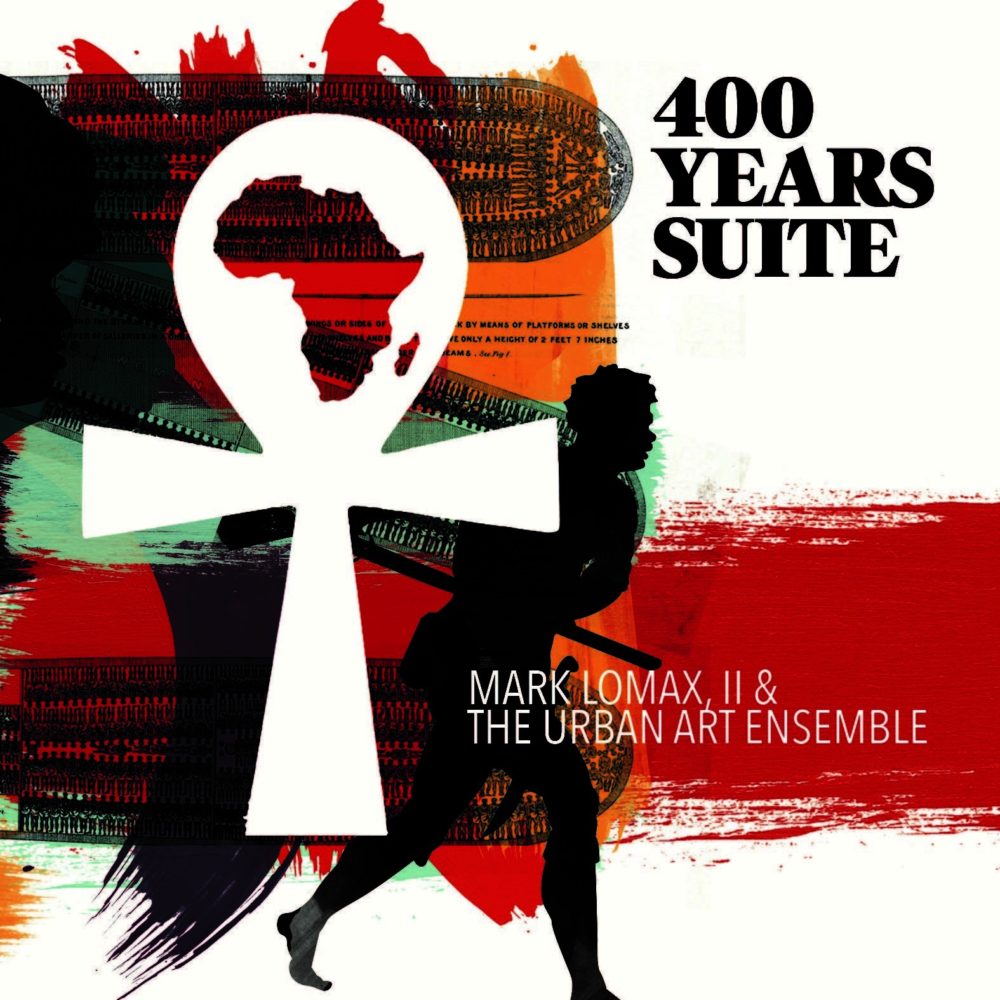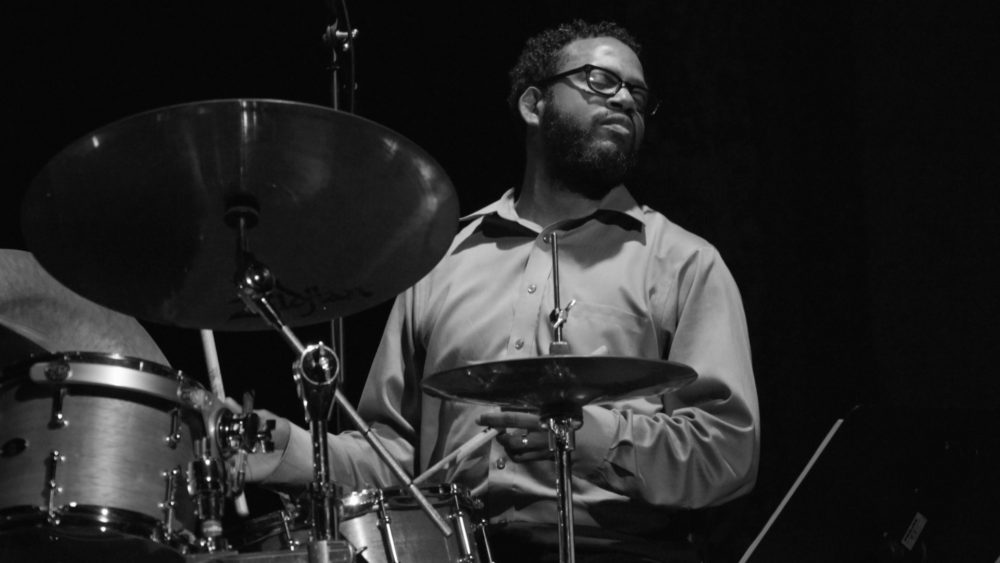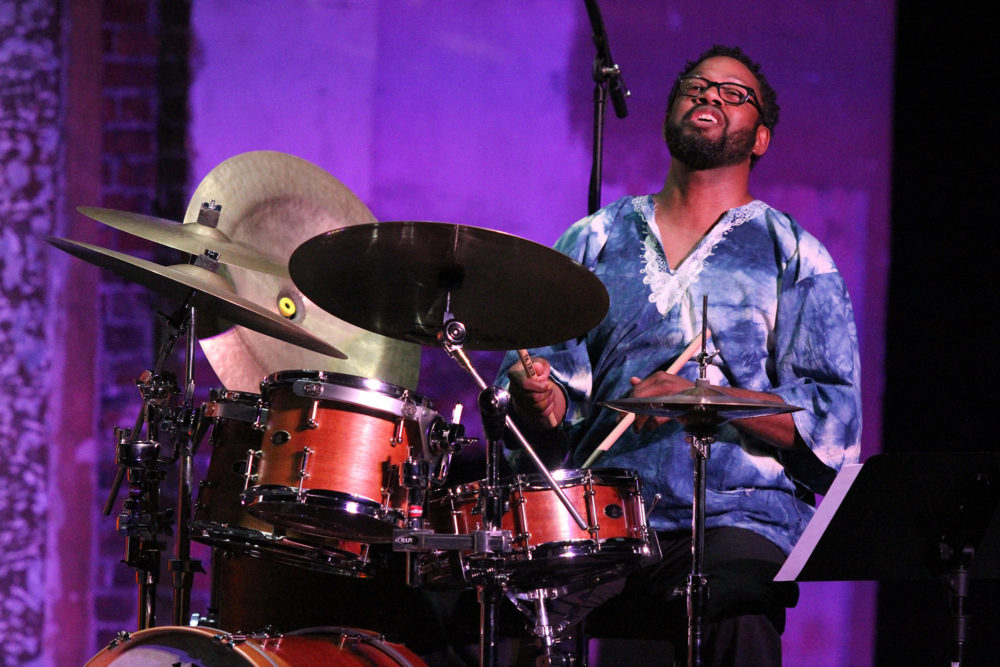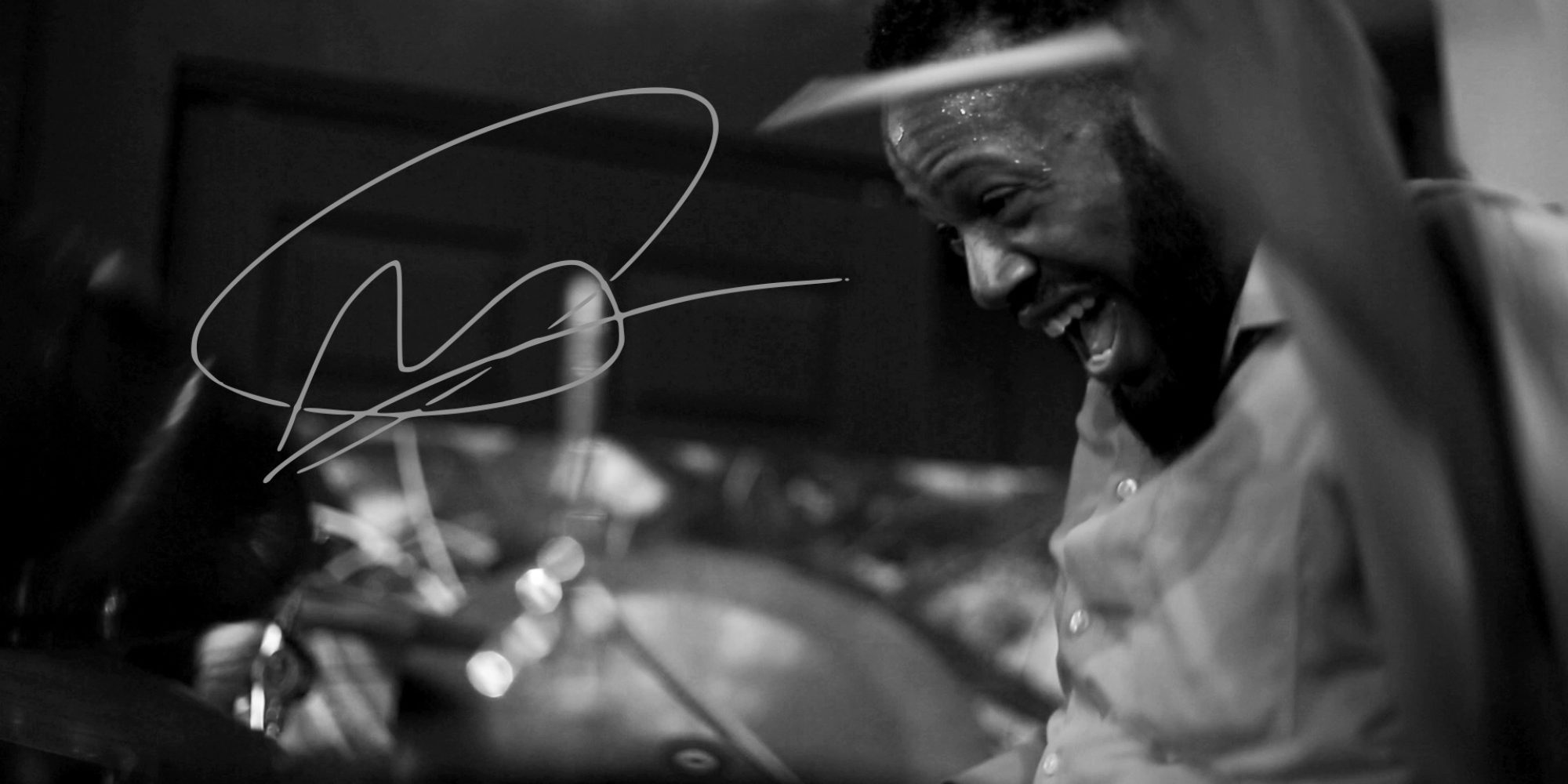Dr. Mark Lomax II told me that “no one in their right mind” sits down to write a 12-album suite, but he's a man devoted to his craft, to his vision, and to creating from his most authentic self, so he has produced 400: An Afrikan Epic, a title that certainly doesn't use “epic” as an overstatement. Spanning from pre-colonial African history, to the middle passage and oppression in North America to an Afrofuturistic vision of the world to come, it encompasses ballet, cello suites and nuanced, expressive percussion.
Lomax is a composer, a drummer and an educator in Columbus, Ohio, so it should come as no surprise that he's exceptionally gifted at explaining why he does what he does, and his vision for the responsibilities that come with being an artist today.
Dr. Lomax spoke to Afropop's Ben Richmond on Wednesday from Columbus, about his work, his critique of the music industry's “Blackout Tuesday,” and the innovative power that's woven into the history of the drum kit.
Ben Richmond:, Well first, I guess I'd like to set things up for our readers. Why don't you go ahead and introduce yourself and what it is that you do.
Mark Lomax: All right. Hi, I'm Dr. Mark Lomax II. I am a composer, drummer, performer who also works in philanthropy and in academia.
Academia and composition seem very simpatico in your work, you have an educational and a historical branch, especially with 400: An Afrikan Epic. Do you want to talk a little about that?
In the African tradition of the jali or what the French called the griot, there was always a cultural component to the performative aspects of their role. The jali knew the history of the group that they had written and performed for. And the music was functional. It was not necessarily entertainment for the sake of entertainment, as we understand in the West. It was always accompanied in some form of "human beingness,” some form of human activity.
And so learning about that through the work of my father, who is also Dr. Mark Lomax and a theologian who's worked with Afrocentric homiletics, which was interpreting the Bible from an African-centered perspective, he and my mom went to Africa when I was a kid. They brought back all these stories and information about how musicians function in West Africa, that really formed my identity as an artist, which to your point, has been educational and the artistic element. Everything that I compose comes from or is inspired by or is even derived from, in terms of material, some form of African or African-American content.
400: An Afrikan Epic is an artistic product that tells the story of African history from people on the African history to the ma'afa of 1619—ma'afa is a Swahili term that means great tragedy—1619 to the present and then the last four albums of the show, really do paint an artistic picture of what I hope the world becomes as people recognize our collective humanity.
Something with that scope—you said it's 12 albums?
Yes. Twelve albums.
How did you first conceive of it? How much outlining did you do? I know musicians always have sort of riffs that are kind of rattling around, but when you sat down to sort of map this out, how did it look?
Honestly, nobody in their right mind thinks about doing a 12-album project, right? Not all at once anyway. But it struck me that I had three years to do something significant, to tell the story and honor that history, that historic moment of 400 years since slavery started in America and then thinking forward for the next 400 years, is really what it's focused on.
I intended to write my first symphony, honestly, and it was going to be a shorter symphony because I felt like that would be easier to get played and three movements, past, present and future. As I began to sketch the theme, it seemed like these characters that were coming up and out were really albums in and of themselves, and the more I allowed that to kind of grow in that way, the more it became real. So themes became movements. And those movements are the entire album as opposed to sections in a symphony.
As I mapped it out, that was probably the most difficult piece because you can't, even when going chronologically, can't put every important incident in that group and breadth of time. So the 12 albums function as abstraction, highly dramatic in form.
The first third really, with precolonial African history, outlines cosmological events, it outlines spiritual ideals that are ethereal, but were absolutely in place, like the Yoruban tradition of the orishas, the Dogon people which is one of the oldest ethnic groups in Africa, who now reside in West Africa.
And then there's a transitional piece called "The Coming," which is written around the book of the same title by Dr. Daniel Black, a man narrates also some of the passages from the book. The middle section, again abstraction and hitting major points, starts with the ma'afa, it's a ballet set on a slave ship, it moves from that to "up south," which is a term we use in the African-American community to showcase how the north was just as complicit in slavery as the south and is the same even though the racism looks a little different in terms of how it functions in society.
Then we go with the more person-to-person component. So there are four women, in cello quartets, each movement represents a portrait of a woman of African descent that I think has contributed to this kind of human being (as a verb) that's defying racism, defying colonialism and is showing strength and is the backbone of the diaspora. And those women are Queen Nzinga who was queen of what is now present-day Angola, and she spent both of her reigns fighting against the Portuguese. They were never captured. Then it’s Ida B. Wells, who is well known. Angela Davis, also well known, and Chimamanda Ngozi Adichie. And the last movement of that section focuses on the work of August Wilson, whose cycle of 10 plays just captured the voice of black America in a way that had not been done before.

But the final movement Uhuru—freedom—Afro-futurism is really returning to the first movement. So it's about after having gone through the hell that is slavery and oppression and all of the things that we find ourselves in right now in the American context. It's the work of reconnecting with our spiritual traditions, reconnecting with our authentic identities as human beings, and leveraging that collective power to create a new world.
It's impossible, this week or probably any week, to not think of these as political pieces. Are you a political artist, would you say?
How do you create art and not be political? In the American context if you're an African-American artist and you're really creating from the most authentic aspect of who you are, you can't help but be political. Because America as it stands has been a place that has denied you your place both in the political arena and the performance of the human being.
So not only am I a political artist, I'm an artist who uses history to provide context for the present moment in order to create work that hopefully helps us understand and to change things in the future, understand the present context to change the situation for the future.
Would you say that that is the obligation of an artist in today's context?
I would say that that is the obligation of an artist who accepts that role in that tradition of the jali or the griot coming from West Africa.
My doctoral degree is in classical composition, and I'm one of fewer than 40 African-Americans in the country who have that terminal degree in classical composition and theory. And that's a big debate for us: whether or not we have the privilege of just being composers or if we have the obligation to use our platform, whether it be our education and position in America's institutions of higher learning or even in the concert hall, to make statements, political or otherwise.
I don't believe for myself that I have the luxury to only be a drummer or only be a composer. I just don't feel like the current situation in America or the situation historically in America would allow me to look at myself in the mirror knowing that I'm not using my work, my platform, to tell these stories to create positive change. Other people don't have that same obligation. So I think that's the individual decision that you have to make to make that commitment.
When I think about griots, I think about them always in a specific community—they're the keeper of the stories for the community, keeping it through song. But the position of an American composer, a composer in academia is different. Who do you see as your community?
I don't think in terms of single community; I think in terms of broader humanity. So there are layers to that. First and foremost, I represent Africa in the diaspora. Period, point blank. I was not born in Africa, I honestly have not even been to Africa. But [Kwame] Nkrumah says "you're not African because you're born there; you're African because Africa was born in you.”

There also is a choice in the American context. Our identity was stripped from us so we cannot as Africans in America always point to some geopolitical state and say, "That's where I'm from. Those are my people. That is my language. Those are my gods." But through study, through contemplation, through investigating and interrogating the lie of what we do, I have found that my work—and it might be because I'm a drummer, I don't know—my work connects most fully to an Afrocentric context, even though I play everything. But the way the music speaks to me comes from an African-centered perspective. And so that is the first community, as it were, that is appropriate.
But I understand also that if I create from my most authentic self, as August Wilson suggested that speaks to everyone. He said, "I write plays for me. I'm not writing for anybody else. But I know that if I write for myself," and he's talking about authenticity and who he is, "then other people can identify with it."
So. If we as Africans in America are expected to be able to engage in some level of entertaining the myth of the Western cowboy, John Wayne, if we are expected to engage the tropes that come from Greece and Rome, why can't we then also engage the tropes and the heroes from Africa and the diaspora and have the same level of impact and engagement from people who are not African? That's what I think.
And so composing and telling this story like the Afrikan Epic Suite is a story that at least the middle portion is in America. It's an American story, then we're all still part of and still acting out, I suppose.
Right. That's why the last section, Afrofuturism is going toward the healing that takes place after justice has occurred. In today's context, people are protesting, rightfully so, righteous indignation. And so many voices are trying to say "stop protesting" or "stop rioting" And you cannot yield without justice.
"No justice. No peace."
No justice, no peace, right? From an artistic standpoint, what we're trying to do is show how African history and existence was disrupted by slavery. And then it took a turn and this new ethnic group "Black" or “Black American” or “African-American,” was birthed out of that disruption.
What's interesting is in the American educational system to be Black American means your history is taught to you only starting at slavery. Stokely Carmichael says, "If your history starts with slavery you'll never overcome it." Which is why we had to have that whole first section of precolonial African history to give context for it happened in 1619 when the first ship landed at the Point Comfort, Virginia from Angola and began the slave trade in North America.
So that time of the past, prior to slavery, gives context to slavery and everything that's happened since, up to the present moment. You have a basis to work from, a strength-based perspective to change the future. When you try to heal a wound and you don't know what the cause is, you can't heal. So we have to have a diagnosis that is accurate. And we also have to remember what it feels like to be happy, healthy and whole. Then we can begin the work of transformation and healing.

Listening to musical traditions that are also in the diaspora and also descended from enslaved peoples in places like Brazil and Cuba, there's still, to my American ears, something in instrumentation that retains, for lack of a better term a sort of "Africanness." There is still the buzz, still instruments that are made from gourds. It seems like, for the enslaved people who were brought to America, that link was really severed in such a deliberate and severe way. So going back and researching for the pre-colonial suite, which communities did you sort of visit and which musical traditions did you find?
I didn't have to do any research for that because I've been steeped in it since I was 8 years old. So I have been learning various musical traditions from across the continent of Africa, both in terms of study and performing for performance practices. I've been teaching spiritual traditions and I have worked with a lot of folks from the diaspora, including South America and the Caribbean.
So that music is in me and further, you're right, because of the Stono rebellion and other such occurrences during slavery, the drum and the actual African practices were stripped from us in a way that it wasn't in South America. And you could also argue in North America, there was a more hands-on approach to slavery, whereas in South America it wasn't the same dynamic. It was just a different way to engage slavery, depending on who's doing it, whether it was Britain or France or Portugal or what have you. So there are more practices that are retained in the southern part of the Western Hemisphere than there are in North America.
But that doesn't mean that just because there's not exactly a one-to-one that those practices don't still exist. So if you think about Santeria and candomble and how they were overlaid with Catholicism, in America the rhythm of the drum, when the drum was taken away, was also transferred or overlaid with other aspects of production. So that's where spirituals and the blues come from. That's where hambone comes from. That's where Juba comes from. That's where our dance styles, the language, the way we speak and the way we walk. All of that is a reflection of the drum.
When the Civil War ends and we're out there in the fields, we're collecting drums, we create for the first time in the world, something called "a drum set." Prior to that event, even now people around the world, you look at the orchestra, you look at African drum choirs, individuals are playing at most one or two drums, three maybe. But never before the drum set or the trap set had one percussionist played every part of percussion.
The drum set has the cymbals, which Max Roach says is the bell, reminiscent of the gongs and bells. The tom toms represent African drums. The bass drum, snare and high hat represent Western military march music. So you basically have the whole world rhythmic voice in the drum set. So that is again, a reflection of that African ingenuity to create something new out of nothing.
So I would say, yes, you're right. There's more direct retention in South America for example and in the Caribbean, but because of the way slavery manifested in North America, we had to create something new. Because the things that we brought with us were taken way, but not the spirit, not the aesthetics, not the ingenuity.
Did you have any performances that have been disrupted by the coronavirus pandemic?
So what we've been doing since the pandemic is a weekly "Drumversations" series--is what we're calling it, live on YouTube every Friday from noon to one Eastern standard time, broadcasting from the basement. We're using the drum to bring some peace, love and light to folks. And we're also discussing issues that we think are relevant for helping people have context for the current time and also tools for how to engage.
One type of activism, “Blackout Tuesday,” happened this week, but you had criticism for it. What was it that made you want to speak up?
I didn't think was a good idea. Toni Morrison wrote that it is precisely times like that artists need to engage. And if you think about music, even from the most mundane to the most deeply spiritual, political, what have you, in times of crisis human beings benefit from music. If it makes you dance, if it makes you laugh, smile, cry, it helps people cope with pressure.
So for the music to stop, for the music industry to say "on this day, we're not engaging," then we're not collectively doing our job. I disagree with that. It would be better if the music industry as a whole would say “hey, because of all of this stuff, instead of stopping, we're leaning in. We're committing to finding artists that have a social justice message. We're committed to elevating artists that we already have on our rosters that have a social justice message. We're going to make as an industry significant contributions to historically black colleges, their music programs and their business programs. We're going to have a clear agreement across the industry that we're going to no longer elevate negative stereotypes of Black Americans,” right? I mean, things like that. “Donate to things like Black Lives Matter or NAACP, organizations that are doing the work of social justice, grassroots organizations that are daily working to fight injustice, racial inequity.” That would have been a tremendous gift to the country and the world. Instead, the industry decided to take a day off.
As an African-American artist, I don't have the luxury again of taking the day off. In fact, since the pandemic occurred, I've been busier that I was even when we were on tour. And I was on tour working a full-time job, and teaching classes at Ohio State, working a full-time job at the Columbus Foundation and trying to be present for my family, while touring. And the industry took the day off. You know what I did during the blackout? I was on the phone for 13 hours—Zoom calls, phone calls, emails, back and forth, helping young people, helping politicians, helping business folks not just understand the context for the current moment, but strategize how to move forward in a more just and equitable way.
I think that the music industry doesn't have a sufficient number of people with your clarity of vision, both artistically and with an understanding of where that fits into a larger context. But I'm glad that you're out there working.
Thank you. We all have a part to play. [Laughs]
Yes. Well, thank you so much for calling and talking with me, Dr. Lomax.
Thank you for taking the time. I really appreciate it.
My pleasure. And let’s talk again soon. And I hope to see see you guys perform when you can safely get out here to the East Coast.








